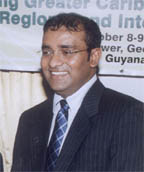President Jagdeo calls for less talk and more action
Caricom SG urges greater Secretariat role
In the face of growing impatience on the part of President Bharrat Jagdeo over the slow pace of progress towards the creation of a viable regional agribusiness sector, Caribbean Community Secretary General Dr Edwin Carrington is advocating a more central role for the Georgetown-based Caricom Secretariat in hastening the pace towards the realization of the regional objective.

Addressing the May 27th opening of the two-day Public/Private Sector Consultation on AgriBusiness Development in the Caribbean Carrington said that there was a need for more effective mechanisms for sustained public/private sector dialogue ”if effective proactive policy and programme responses are to be put in place for promoting agribusiness in the region.” He said that such mechanisms must be able to respond both at the sector and the industry-wide levels. “At the industry-wide level, primary attention would focus on policy issues while at the sector level, primary focus would be on elaboration and implementation of operational programmes,” he added.
And Dr Carrington told the forum that he believed that the Secretariat was “well positioned” to coordinate interventions in the sector by regional and international development partners and to serve as a clearing house for information to stakeholders involved in the process of taking the regional agribusiness sector forward. Additionally, Carrington said that the Secretariat can facilitate public/private sector discourse on issues facing the regional agribusiness sector.
Dr Carrington’s advocacy of a more central role for the Caricom Secretariat in what has come to be regarded as a tedious process towards the building of a strong and competitive regional agribusiness sector, comes amidst expressions of frustration, particularly from Guyana’s President Jagdeo over fears that what is widely believed to be the need to strengthen regional food security and to create an internationally competitive agribusiness sector has been reduced to a proverbial “talk shop.”
Separate addresses to the regional agribusiness forum by Dr Carrington and Agriculture Minister Robert Persaud both pointed to the need for the meeting to conduct its deliberations against the backdrop of the sense of urgency that has now come to be associated with the mission of creating a strong regional agribusiness sector. However, it was President Jagdeo’s far more directly expressed concern with what he clearly regards as a preponderance of talk and a lack of corresponding practical action that left its mark on the forum.
President Jagdeo, who is the lead Caricom spokesperson on the regional agricultural sector has been publicly identified with the 2007 Agriculture Donors’ Conference as well as last year’s highly publicized Agriculture Investment Forum and his recent public expression of frustration over the limited outcomes of those fora is clearly intended to signal to the rest of the region his concern over the slow pace of proceedings.
Advocacy of a far greater sense of urgency in pursuit of an enhanced regional agricultural sector is taking place against the backdrop of what is regarded as an unsustainable food import bill which cost the Caribbean an estimated US$3 billion last year as well as the desirability of the Caribbean positioning itself to meet international market demands in the face of a widely predicted global food crisis.
In his address to the forum Dr Carrington said that with the global financial and economic crisis impacting severely on all of the Caribbean economies the regional agribusiness forum was being held “not a day too soon.” He said that if the region is to succeed in its quest to create a viable agribusiness sector it must work together “in order to combat the challenges posed by high production costs, high food prices and threats posed to food security and the small size of our economies.”
Carrington told the forum that the creation of a regional agribusiness sector must take account of “a range of demographic, social, technological, organizational and economic trends” including the opportunities for the Caribbean with regard to higher value food products and services arising out of urbanization and increased purchasing power among consumers.” Additionally, Dr Carrington pointed to the need for the regional agricultural sector to take account of consumer lifestyle preferences, food safety considerations and the important strategic and innovative marketing in its quest to create a successful agribusiness sector.
Meanwhile, according to Dr Carrington the international marketing of regional agricultural products will also be challenged by what he described as “the internationalization and privatization of standards” which he said had taken on greater meaning with the reduction of tariff and similar trade barriers. He said that while this phenomenon “could represent major barriers to entry or to continued market access in the form of compliance requirements and costs on the part of emerging market suppliers,” there still remains potential for the creation of a viable regional agribusiness sector.
Meanwhile, Dr Carrington said that there was a need to recognize both “the lead role which the private sector must play in responding to the new challenges facing the sector” as well as “a need to agree on the complementary role of government.” The Caricom Secretary General said that the effective pursuit of a strong regional agribusiness sector also spoke to “the need to facilitate better access to information, not only market information but, more generally speaking, information regarding sector support initiatives and supplemental resources.”
